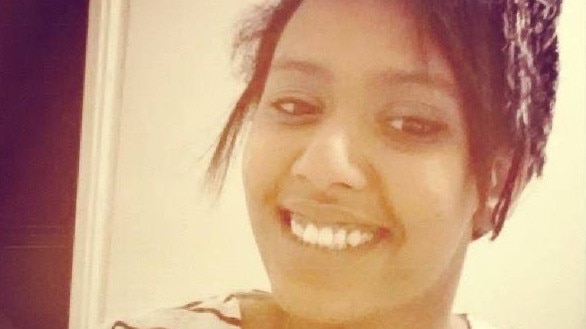Claims murder-accused didn’t ‘do a thing’ to save pregnant partner
A man accused of murdering his pregnant partner took drugs after inflicting injuries that left her brain ‘too swollen to survive’, the prosecution has alleged.

Police & Courts
Don't miss out on the headlines from Police & Courts. Followed categories will be added to My News.
A man accused of murdering his pregnant partner took drugs without a “care in the world” after inflicting injuries that left her brain “too swollen to survive,” the prosecution has alleged at the trial’s closing.
Nilisi “Nick” Kaniki, 30, is facing trial at Brisbane Supreme Court accused of murdering his pregnant partner Selma Ibrahim at her Crestmead home on or about the evening of September 24, 2019.
Ms Ibrahim had been seven weeks pregnant at the time of her death but likely unaware, the jury were told.
The prosecution allege Kaniki repeatedly punched Ms Ibrahim around 7pm the night of September 24, inflicting the blunt force injuries that ultimately left her brain “too swollen to survive”.
Crown prosecutor Nathan Crane suggested to the jury during his closing statement on Thursday that Kaniki had then sat “on the ground with his drugs” while Ms Ibrahim lay on the bed “unconscious, bleeding”.
He told the jury Ms Ibrahim would have had “diminished consciousness” from the level of blood flowing from her head injuries.
“Not a thing gets done about it – no calling of the ambulance, no taking her to a doctor – because that’s what (Kaniki) wanted to do,” Mr Crane said.
“All of this blood, not seemingly a care in the world about her at that time.”
“And then in the morning it’s … what am I going to do now?”

The jury was told throughout the trial how Kaniki called triple-0 the following morning, after – on his account – he came home to find her unconscious and attempted CPR himself.
Defence barrister Jacob Robson suggested that the jury would have been able to hear Kaniki’s “urgency,” “shock” and “distress” in the triple-0 call.
Kaniki told police Ms Ibrahim had already been assaulted by the time he claimed to have arrived at her home around 3pm on September 24.
He said he had spent some time with an injured Ms Ibrahim that night, before leaving her in “fine” condition around midnight to get more drugs.
Mr Robson said on his client’s account, Kaniki had suggested calling an ambulance on the night of the 24th and that Ms Ibrahim had said she didn’t need one.
He noted that there was no evidence the severity of Ms Ibrahim’s injuries would have been as obvious that night as they were the following morning.
Mr Crane suggested Kaniki instead stayed throughout the night and took Ms Ibrahim to the bathroom to try to wake her up himself, rather than immediately calling triple-0, to avoid drawing attention to the injuries he had allegedly inflicted.
Ms Ibrahim was declared dead at 7.07am on September 25 – just eight minutes before the prosecution claim Kaniki sent a text saying “bro if anyone asks I was with you last night”.
Kaniki denied sending the text, which the jury were told he had deleted, in an interview with police later the same day.
Mr Crane had labelled the text during his opening statement a classic case of setting up an alibi.
Mr Robson told the jury that his client would have been drug affected and tired at the time as he hadn’t slept in days.
He said Kaniki could have lied to police because he was embarrassed about how the message could have been interpreted.
Mr Robson had previously asked the jury to question why his client would lie about being away between midnight and 6.30am when, on the prosecution’s case, the injuries were likely inflicted before midnight.
“How is that an alibi?” he had asked.
In closing, Mr Crane responded that “it isn’t”.
“He (Kaniki) didn’t do a very good job of it … That’s why we’re all here,” he said.
Mr Robson told the jury his client’s lengthy account of events to police had been clear and didn’t shy away from details that may now seem “distasteful” – including that Kaniki and Ms Ibrahim had sex on the night of September 24.
He said a thorough examination of his client’s hands found no swelling or breaks in the skin.
“If the assault was as bad as they say it was, you’d expect to see injuries to his hands.”
Mr Robson said the prosecution’s case was “just a theory” and emphasised that his client was presumed innocent unless they were satisfied beyond reasonable doubt.
The jury were told Kaniki had proffered an alternate theory to police that Ms Ibrahim’s drug dealer was responsible for her injuries.
Mr Crane submitted there was no evidence of Ms Ibrahim fighting with the dealer or having any difficulty paying for the $20 sticks of weed she had purchased.
He submitted it was “preposterous” to claim somebody had broken into the house given the lack of supporting forensic evidence.
“The only person who possibly could have done it is Mr Kaniki,” Mr Crane said.
Mr Robson told the jury that he had “lost count” of the times Mr Crane had said “maybe” and “potentially” during his closing statement.
“That’s not good enough for a charge of murder,” Mr Robson said.
He claimed there were multiple lines of inquiry that police failed to properly investigate, including reports of suspicious youths on Ms Ibrahim’s street the night of the 24th.
Kaniki pleaded not guilty at the start of the trial to one count of murder and one of unlawful assault of a pregnant female destroying the life of a child before its birth.
The jury are expected to begin their deliberations after Justice Sean Cooper delivers him summing up on the case on Thursday afternoon.


